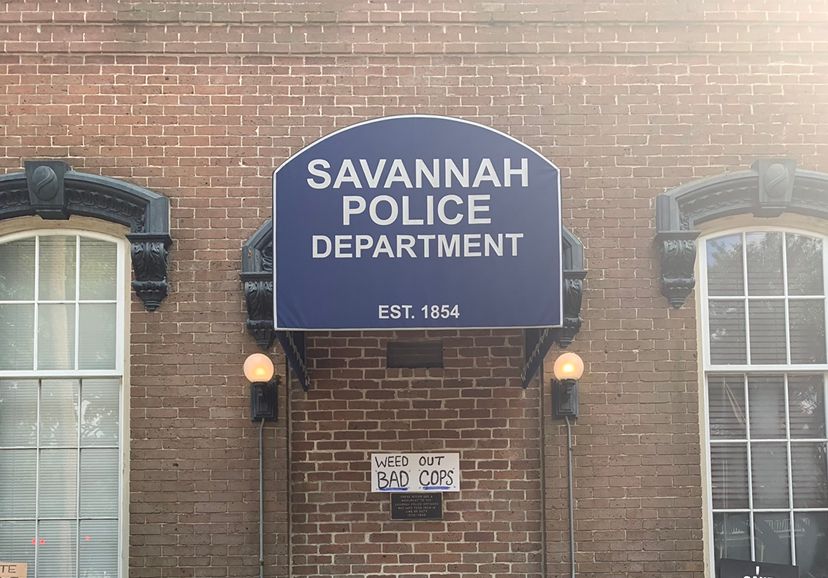By Rachael Flora
THE Savannah Police Department is headed for a crisis, say its officers, and immediate action is needed to prevent a mass walk-out.
Issues of staffing and retention, outdated equipment and ineffective leadership repeatedly come up in comments made by SPD officers in a recent survey.
The Savannahian obtained a copy of the results of the Continuous Improvement Survey as completed by the Savannah Police Department. An email exchange in connection with the survey seems to indicate that the survey is a City program, and SPD was one of the first agencies given the opportunity to participate. 255 people completed the survey.
Complete SPD Survey Results by Rachael Flora on Scribd
The most resounding call is for more staff, immediately. One respondent claims that over 50 officers resigned last year, and another estimates the department as being 100 officers short. When asked about staffing problems, according to survey results, the SPD brass chalks it up to the national staffing shortage–but one respondent notes that other departments are not suffering as drastic a decrease.
Officers are now working 12-hour shifts to make up for the lack of staff, leading to burnout. Adding to the strain are the special events that the officers are asked to work, along with a general increase in service size because of the newcomers to Savannah. (And that doesn’t factor in tourists, college students, and the unhoused population, the latter of which has increased since evictions have resumed.)
The respondents also take offense to Mayor Van Johnson’s cost of living adjustment, where civilian employees of the city were given a higher raise than officers.
“The recent attempt at a COLA shows how little the CM, Mayor and Alderperson’s [sic] care about SPD. The inequity of providing civilians with 8.48% and Officers with 2.5% is abhorrent and without an explanation,” writes one respondent. “Why are we valued 5.98% less than our civilian peers?”
The starting salary for an SPD officer is listed as $44,330 on the department's website. City employees were paid around $11 an hour, or roughly $22,800 a year before taxes, before Mayor Johnson raised the city minimum wage to $15 an hour.
Perhaps most upsettingly, the officers aren’t given the proper equipment to keep them safe. They have to buy their own tourniquets, says one respondent, because they aren’t included in their first aid kits.
“Medical equipment offices are given a first aid kit to treat any injuries sustained [while] working. However this first aid kit does not have the adequate supplies need [sic] to treat more serious injuries that an officer will face when working,” writes one officer. “There is no tourniquet, or clotting agents to stop massive bleeding from injuries consistent with gunshot wounds or a car accident. The first aid kit given can only treat minor scrapes and bruises.”
“Newer officers are required to wear recycled armor systems fitted to retired or past SPD officers to work while on patrol,” writes another. “When wearing life saving equipment it will make a difference in saving or life or not, depending on if it fits properly.”
Officers have also been asking for different protective gear that doesn’t sit on their lower back, as that could lead them to develop back problems.
The technology is also outdated and takes too long to use, reports one officer: “Just the other day, there were several officers standing at the TWO computers we have available to use for reports after hours. Due to the limited number of MDTs this is our only option. Now, the thirty minutes necessary to finish our reports has turned into two hours. Often times we have emails before we even arrive home stating officers need to stop taking so much overtime; an issue we can’t fix.”
Survey respondents also accuse the police chief of making decisions for their political expediency instead of their morality, saying that Chief Minter along with Mayor Johnson, City Manager Jay Melder and City Council care more about saving political face than the safety and wellbeing of the police department.
In fact, it seems that the culture of leadership at SPD is toxic enough that many respondents call for all management to leave.

“Fire Chief Minter. Fire all majors - a snake will live unless you cut off the head. The leadership is so poor,” writes one respondent. “HR should already be aware of the very poor job Minter has done/is doing as chief. His selected majors are just as incompetent, lack the communicative skills, and get caught in just as many lies as Minter.”
The top brass has been described as “unapproachable” and not willing to listen to officers below them. Worse, the management seems to be aware of a bad environment–but simply accept it and try to get newbies used to it, rather than trying to change it.
One respondent writes, “From the PTR process on you are indoctrinated into the belief system that the agency is illogical and unfair. The first time I present an idea in a roll call meeting the Sgt told my PTO to, ‘Tell your rookie to shut up’ and that ‘I was talking about things that made sense and that wasn’t how things worked here.’ He was joking but never the less [sic] the room nodded in agreement.”
SPD brass has also been accused of lying about statistics. One respondent wrote, “We are tired of being blatantly lied to by the Command Staff. We know statistics are not correct when given to the public and Alderpeople. We do not like the way the Chief of Police treats us.”
Another respondent wrote, “Command staff only cares about ‘stats’ and only show their face when something happens in a tourist area.”
One respondent simply writes, “It seems to me most people quit because of bad leadership, not the job.”
In fact, many of the respondents say that things are fine on the precinct level, with some saying they love their precinct and are staying in the job out of duty to their fellow officers.
The allegations of poor management are not new: in April 2020, now two years ago, 72 officers filed a complaint against Chief Roy Minter, accusing him of favoritism, intimidation and outright disrespect. The complaint has seemingly gone nowhere, and the issues that officers detailed then have not been resolved in that time. If anything, the number of officers who want Minter out has only increased since then.
The survey answers touch on policing issues in the post-George Floyd climate: the distrust in police is at an all-time high, and the officers report feeling unappreciated and sold out in the name of politics.
One officer writes, “This city needs to stop treating officers like we’re evil. Everyone hates the cops but constantly calls 911 for everything and we do our best to serve the community, even if we are scrutinized by everyone.”
Another writes, “I will be leaving as a result of this disturbing decision made by a corrupt city council that has sided with the BLM domestic terrorists over its own police department.”
How true is that claim? Amid calls for defunding the police, Mayor Johnson–a high-profile Democrat and member of the DNC, and also a former police officer–said he would “absolutely not” defund the police when asked about it back in 2020. He announced the creation of a Blue Ribbon Task Force to investigate and provide solutions to any issues in the police department, but there doesn’t seem to be much action with it.
However, in the City of Savannah’s 2022 adopted budget, the police department is slated to receive just over $65 million, which is actually a decrease of about a million from the 2021 adopted budget. The public safety budget, of which SPD is included, sees a 9.2% decrease in total allocation from the general fund–it now only gets 39.6% of the city’s overall budget, though still the largest group.
FY22 Adopted Budget for Savannah Police Department by Rachael Flora on Scribd
General Fund Expenses by Rachael Flora on Scribd
It’s unclear in the budget which department is responsible for equipment, but the Professional Standards and Training section was cut by about $10,000. The office of the police chief received an increase of about $80,000.
Training has also been called out as an issue: several respondents mention that there are no physical fitness standards and that officers are not held accountable when they’re unfit for duty.
“We do not take defensive tactics training serious, first aid training or firearms training,” writes one respondent.
“When you have newer (less trained, less experienced) officers it’s a huge liability issue,” writes another. “Those officers make more mistakes than the senior, more experienced officers. Those mistakes can lead to big issues that I’m fairly certain the city doesn’t want or need.”
In the first four months of 2022, there have been three officer-involved shootings that the GBI has been called in to investigate.
So, what’s next? As mentioned, a number of officers stated they’re actively searching for other employment. It’s a vicious cycle: as the number of officers dwindle, the remaining officers will be worked even harder, burn out faster, and eventually choose to leave as well, leaving the department with even fewer staff. The current ratio is 2.1 officers per 1,000 served, an abysmal number that leaves crimes unsolved and public safety in peril.
For our city to meet the national average, which is 3.4 officers per 1,000 served, the SPD would need to have 680 officers on staff. The 2022 budget shows that the department is only budgeted for 626 officers, so it’s already operating at a deficit.
But, bringing new officers into a poisoned police department doesn't solve anything; after all, one bad apple spoils the bunch.
The resounding solution officers give to remedy the situation is loud and clear: hiring more officers and firing Chief Minter.

